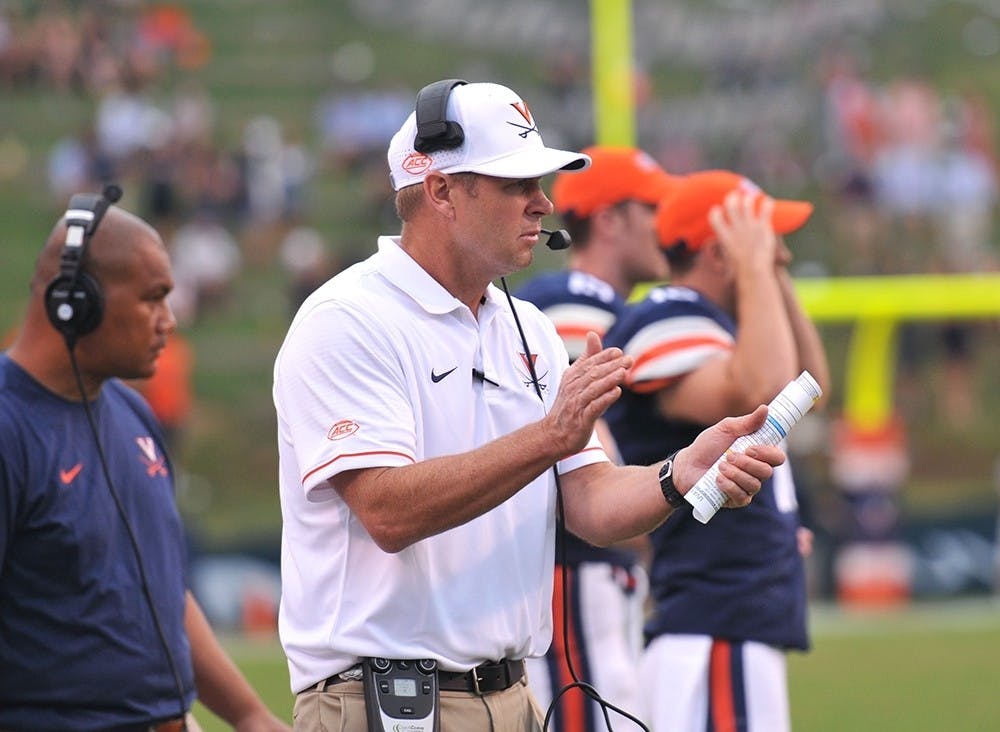When Coach Bronco Mendenhall was hired to replace Mike London last year, Virginia’s football program inspired optimism for the first time in years. However, after a first season in which Virginia lost to FCS contender Richmond, got beaten by Virginia Tech, 52-10, and went 2-10 (1-7 ACC), the optimism around Grounds has deflated.
Mendenhall’s first season seems to be universally viewed as a disappointment on the field. He inherited a team that many felt underachieved at 4-8 (3-5 ACC) the year before and returned its starting quarterback in Matt Johns. Yet, he still proceeded to win only two games. Thankfully, based on history, this lackluster first season says little about Mendenhall’s future at Virginia. No head football coach out of the 15 hired since 1931 has had a winning record in his first season coaching the Cavaliers. Even basketball Coach Tony Bennett lost more games than he won his first season — the only time that has happened during his tenure in Charlottesville. Despite his inauspicious start, Mendenhall may achieve success coaching the Cavaliers.
Defining what success would look like on the field this season is no easy task, though. It would be unrealistic to expect Mendenhall to reach the ACC Championship game, but another two-win season would undoubtedly be considered a disappointment.
To quantify a fair target for Mendenhall this upcoming season, it seems necessary to take stock of expectations for the Cavaliers this year. Nobody seems to expect much, as Virginia was ranked last in the ACC Coastal by the media to start the year. However, the Cavaliers are universally expected to improve, as Vegas betting markets believe they are a five-win team.
The underlying data supports this, as the Cavaliers were unlucky last season, losing three one score games without winning any, and turning the ball over nine more times than they forced them.
Virginia underperformed relative to its talent as well, as the Cavaliers ranked 88th in the country in S&P+ — an opponent-adjusted college football ratings system derived from the play-by-play and drive data of all FBS college football games) — despite ranking 46th in five-year recruiting rankings — a measure of the total talent on the roster.
The Cavaliers also return many of their top senior performers, including quarterback Kurt Benkert, safety Quin Blanding and linebacker Micah Kiser. In total, Virginia retained 74 percent of its 2016 production according to SB Nation's metric, which ranks 25th in the country. This means the team will not only be more experienced in Mendenhall’s system this season, but also in playing at the college level in general.
Based on these statistics, expecting an improvement from the Cavaliers seems reasonable for any sort of measure of success from a pure statistical perspective. However, the opinions of those who support the Cavaliers matter just as much, and the numbers matter significantly less to them. To fans, what happens on the football field only matters to the extent it creates excitement — the enjoyment of the product is more important than the product itself.
Combining the statistical expectations for the team with increased excitement around the program, there are a few potential standards of success. One metric would be a home victory over a Top 10 team, such as successfully finishing off the failed upset attempts against Notre Dame in 2015 and Louisville last season. Additionally, a win over rival Virginia Tech in Charlottesville would boost the fan base — breaking a losing streak dating back to 2004 — and is realistic enough, as S&P+ gives Virginia a 30 percent chance of winning. Lastly, a bowl game would likely require only one win more than the Las Vegas projection and would signal to the fan base that perennial losing seasons are a thing of the past.
While these provide some tangible targets for the year, defining a goal for the Cavaliers is no easy task. Things such as recruiting, thoughtful succession planning and development may be equally important for the long-term health of the program. These goals are difficult to determine, and even more difficult to quantify.
While it may not be possible to pin down a specific metric of success for Mendenhall in 2017, it seems important that he helps make rooting for Virginia football fun again and that he removes the connotation of shame and embarrassment associated with the team. If Mendenhall can return the joy to Virginia football, it won’t matter how he did it — his season will certainly be a success.







